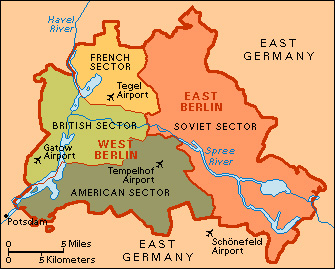Berlin Airlift was the historic effort by which France, the United Kingdom, and the United States supplied West Berlin entirely by air during a Soviet blockade. The airlift lasted from June 1948 to September 1949. It brought in food, coal, petroleum, and other supplies to more than 2 million people in West Berlin. The Berlin Airlift, which saved West Berliners from starvation, ranks among the most important and dramatic incidents of the early Cold War.
After World War II ended in 1945, Germany was divided into East Germany, controlled by the Soviet Union; and West Germany, occupied by France, the United Kingdom, and the United States. The city of Berlin was also divided, its eastern section controlled by Soviet Communists and its western part by the three Western powers. Berlin lay well within East German territory. The Western powers generally brought supplies to West Berlin by way of trucks or railroad cars.

As Cold War tensions mounted, the Soviets attempted to drive the Western powers out of Berlin by blocking all highway, rail, and water traffic through East Germany to the city. However, American and British airplanes then delivered supplies to West Berlin by air. In more than 250,000 flights, the planes flew in more than 2 million tons (1.8 million metric tons) of goods. The Soviet Union ended its blockade in May 1949. The airlift continued until September.
See also Halvorsen, Gail.
